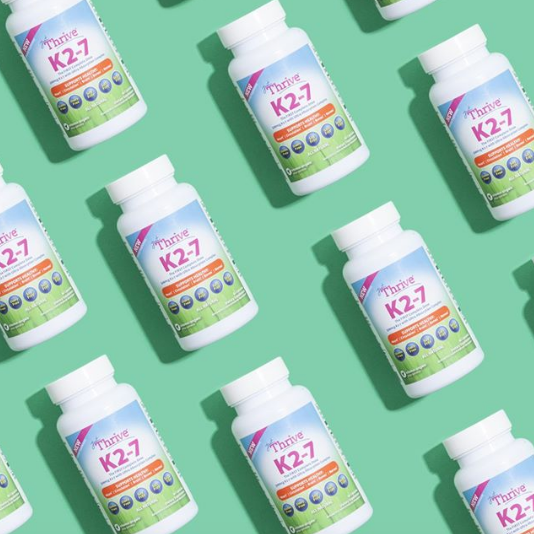Live Longer and Healthier with Vitamin K2-7
Here's a little secret that applies to most people: NONE of us are getting enough of super-crucial, super-nutrient Vitamin K2-7. And that can lead to some serious health issues.
The problem is that It’s almost impossible to get enough vitamin K2-7 through diet alone, making it one of the most important supplements to take.
And most doctors aren't talking about this issue (in fact, they may not even know about it!). But getting enough vitamin K2-7 can save your life… literally. Not only does this amazing nutrient protect your heart, bones, and kidneys, it can help you live longer and healthier. Keep reading to learn how!
The Life-Saving, Heart-Supporting, Bone-Stengthening Vitamin
It might sound like K2-7 is too good to be true, but it’s exactly that good for you. After all, it’s been referred to as “Activator X” by Weston A. Price for a reason: Vitamin K2-7 activates many critical proteins that your body needs to stay strong and healthy.
Here’s just a quick look at some of the benefits K2-7 brings:
- Stronger, more dense bones (link)
- Blood sugar management (link)
- Better heart function (link)
- Healthier blood vessels (link)
- Reduced risk of Metabolic Syndrome (link)
- Protection against cancer (link)
- Increased brain power (link)
- Healthier kidneys (link)
- Longer, healthier life (link)
In fact, one of K2-7’s most important functions involves calcium management. By creating special proteins, K2-7 makes sure calcium goes into your teeth and bones – exactly where you want it – and stays out of your bloodstream, where it can do serious damage to blood vessels, heart tissue, and vital organs.
Clearing Up Vitamin K Confusion
You’ll probably never see vitamin K2 on a nutrition facts label. That’s because the FDA is not up to date when it comes to vitamin K research. The recommended “adequate intake” covers vitamin K in general, and it’s absolutely inadequate for K2 based on the latest science. In fact, up to 31% of “normal healthy adults” suffer from vitamin K deficiency. (link)
Plus, you won’t usually know how much vitamin K you’re getting because the FDA doesn’t require vitamin K to be listed on food labels, even though it’s one of the most important nutrients needed for good health – and going without it can severely damage your health. Especially if you're taking a regular Vitamin D supplement (read more on that below).
On those rare occasions that you do see vitamin K listed on a label (sometimes on fortified foods), you still won’t know how much K2-7 you’re getting because it gets lumped in with “vitamin K.” But vitamin K isn’t a nutrient… it’s a nutrient family, and the whole family is necessary to keep you fully healthy. (link)
Vitamin K1 and Vitamin K2
The two main types of vitamin K are K1 and K2. And while they both have K in their names, they perform completely different functions in the body. They even come from different food sources – and you won’t find them together in a single natural food.
While K1 is primarily responsible for healthy blood clotting, K2 has many more responsibilities. So many, in fact, that there are several different forms of K2.
The forms of K2 are called menaquinones (or MKs) and they range from MK-4 to MK-13. Of all of those, the most important and most absorbable is MK-7… also known as Vitamin K2-7.
Note: K is also the chemical symbol for potassium, an essential mineral that has no connection to vitamin K.
It’s Hard to Get Enough K2-7
No matter how hard you try, it’s nearly impossible to get enough vitamin K2-7 on your own for four key reasons:
- Very few foods contain K2, and many of them aren’t part of a standard American diet. The richest food sources of K2 include:
- Natto, which is soybeans fermented with Bacillus subtilis
- Goose liver
- Dairy products from grass-fed cows (the grass-fed really matters here)
- Egg yolks
- Dark meat chicken
- Your body has the ability to convert some K1 into K2, but it doesn’t do a great job of that. Normal diets contain 10 times more K1 than K2, because K1 is found in dozens of plant foods, making it easier to get more of. Some of that K1 does get transformed into K2, but the process is highly inefficient – so don’t count on that for your full day’s K2 supply. (read more on that)
- An unbalanced gut microbiome messes with your K2-7 quantities. Why? Because beneficial bacteria (probiotics) in your gut produce vitamin K2. So when your microbiome is in good balance and the probiotics outnumber the pathogens (bad bacteria), your gut contributes about half of the K2 you need every day. But in dysbiosis, when your microbiome is out of balance and pathogens outnumber probiotics, K2 production grinds to a halt. The takeaway: You need a healthy gut (think Just Thrive Probiotic!) to get enough K2-7.
- Antibiotics can create a vitamin K2-7 deficiency (even if you are getting enough of vitamin K2-7) because antibiotics can kill off the beneficial, K2-producing bacteria in your microbiome, disrupting your body’s own natural supply. (read more on that)
Bottom line: It’s nearly impossible to get enough vitamin K2-7 to keep your heart, bones, and brain healthy…that is, unless, you take a high quality K2-7 supplement.
Even Better with a Team
As beneficial as vitamin K2-7 is, it works best when combined with other nutrient co-factors, including:
- Vitamin K1
- Magnesium
- Zinc
These supportive nutrients increase vitamin K2-7 absorption and bioavailability so your body can get the full health benefits.
You’ll find those co-factors along with all-natural, pharmaceutical grade vitamin K2-7 in Just Thrive Vitamin K2-7. Plus, Just Thrive Vitamin K2-7 is the only product available on the retail market that contains the optimal dose of 320 mcg per day.
Click here to try Just Thrive Vitamin K2-7 today.









